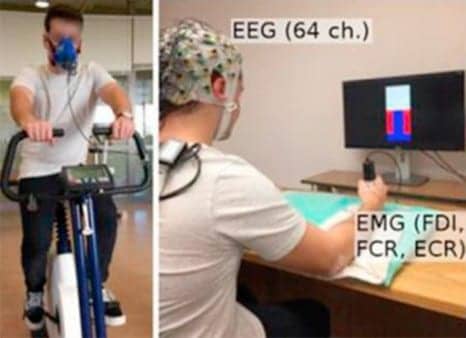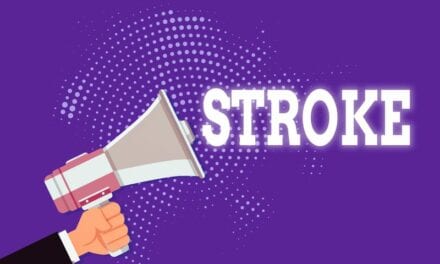
Participants in the study were divided into those who rested after a first take on a new motor skill and those who rode an exercise bike for 15 minutes. When asked to repeat the same task 24 hours later, those who had exercised used far fewer brain resources. (Photo courtesy of McGill University)
As little as 15 minutes of cardiovascular exercise could help increase brain connectivity and efficiency. It may also help accelerate the recovery of motor skills in stroke patients or those who experience mobility problems following an injury.
These findings are according to a recent study in NeuroImage, conducted by researchers from McGill University.
In the study, the researchers asked study participants to perform two different tasks. First, in what is known as a “pinch task,” participants gripped an object akin to a gamers’ joystick (and known as a dynamometer) and, using varying degrees of force, moved a cursor up and down to connect red rectangles on a computer screen as quickly as possible. This was then followed by 15 minutes of exercise or rest.
Participants were then asked to repeat an abridged version of this task, known as a handgrip task, at intervals of 30, 60, and 90 minutes, after exercise or rest, while the researchers assessed their level of brain activity. This task involved participants in simply repeatedly gripping the dynamometer, for a few seconds, with a similar degree of force to that which was used to reach some of the target rectangles in the “pinch task.”
The final step in the study involved participants in both groups repeating the “pinch task” 8 and then 24 hours after initially performing it, allowing the researchers to capture and compare brain activity and connectivity as the motor memories were consolidated, explains a media release from McGill University.
According to the researchers, those who had exercised were consistently able to repeat the “pinch task” connecting different areas of the brain more efficiently and with less brain activity than those who hadn’t exercised. More importantly, the reduction of brain activity in the exercise group was correlated with a better retention of the motor skill 24 hours after motor practice.
When they looked more specifically at what was going on, the researchers discovered that, after exercise, there was less brain activity, most likely because the neural connections both between and within the brain hemispheres had become more efficient, the release continues.
“Because the neural activation in the brains of those who had exercised was much lower, the neural resources could then be put to other tasks,” explains Fabien Dal Maso, the study’s first author. “Exercise may help free up part of your brain to do other things.”
The researchers further suggest the importance of sleep in improving skills retention.
“Sleep can interact with exercise to optimize the consolidation of motor memories,” states Marc Roig, the study’s senior author. “It is very exciting to be working in this area right now because there is still so much to be learned, and the research opens doors to health interventions that can potentially make a big difference to people’s lives.”
[Source(s): McGill University, EurekAlert]




